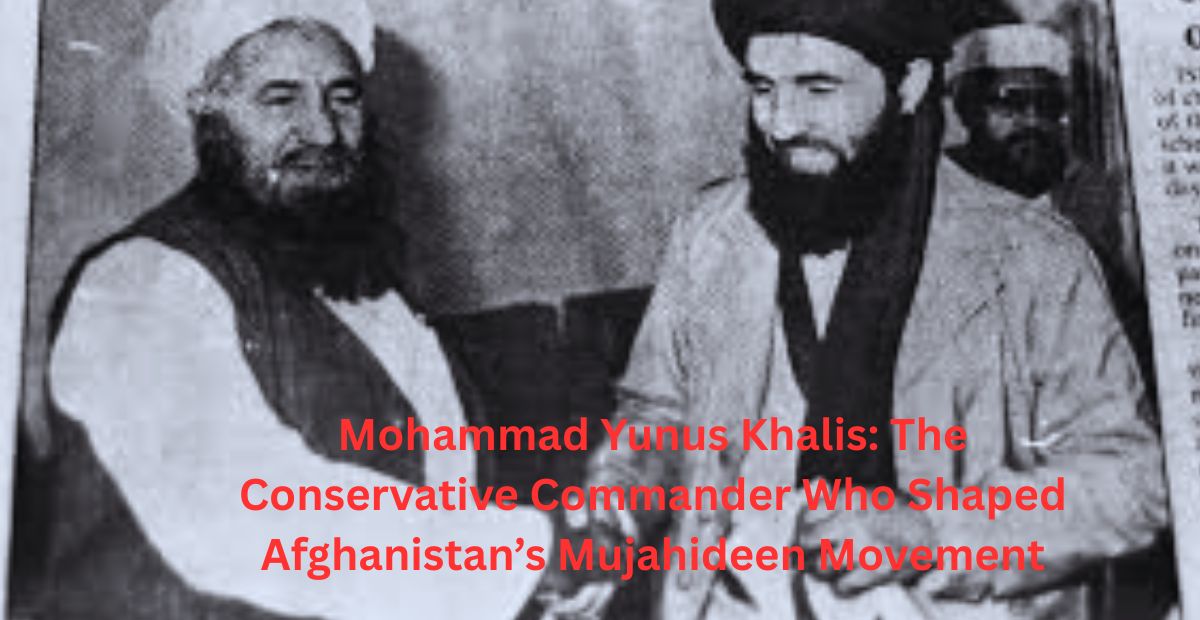Keywords: Mohammad Yunus Khalis, Hezb-e Islami Khalis, Afghan mujahideen, Nangarhar, Soviet-Afghan War, Afghan Taliban, Jalalabad, Pashto poetry
Introduction
Mohammad Yunus Khalis (Pashto: محمد يونس خالص), a key figure in Afghanistan’s recent history, played a significant role in shaping the resistance against Soviet occupation and later became an influential religious and tribal leader. As the founder of Hezb-e Islami Khalis, he left a profound imprint on the mujahideen movement and post-Communist Afghan politics. Revered by some as a spiritual father and criticized by others for his strict conservatism, Khalis remained a powerful, if sometimes shadowy, figure until his death in 2006.
Early Life and Education
Born in 1919 in the Khogyani District of Nangarhar Province, Khalis hailed from the Khogyani tribe of Pashtuns. He pursued Islamic education at the renowned Darul Uloom Haqqania seminary in Akora Khattak, Pakistan, a school that also produced several prominent Taliban leaders. His deep grounding in Islamic theology shaped his worldview and later influenced his political and military leadership.
From Exile to Commander: The Birth of Hezb-e Islami Khalis
Khalis initially joined Gulbuddin Hekmatyar’s Hezb-e Islami, one of the earliest Islamist resistance movements. However, ideological and strategic differences led him to split and form his own faction in 1979, soon after the Soviet invasion. His group, Hezb-e Islami Khalis, quickly became one of the major mujahideen forces resisting Soviet and Democratic Republic forces.
Unlike many Islamist leaders who relied on pan-Islamist rhetoric, Khalis drew heavily from tribal loyalties in eastern Afghanistan, particularly in Nangarhar, earning him the nickname “the don of Nangarhar.”
International Recognition and Meeting with Ronald Reagan
In 1987, Yunus Khalis visited the White House, meeting U.S. President Ronald Reagan, who famously called Afghans “a nation of heroes.” This moment was symbolic of the U.S.-backed mujahideen movement against Soviet forces. Khalis’s visit came shortly after a U.N. resolution urging Soviet withdrawal, underscoring his role as a major international figure in the Afghan resistance.
Role in Post-Soviet Afghanistan
After the fall of the Communist regime in 1992, Khalis participated in the formation of the Islamic State of Afghanistan but declined any formal position in Kabul. Instead, he remained in Nangarhar, where his faction held considerable control. His decision to stay in the provinces reflected his belief in local governance and his deep ties to tribal networks.
Khalis maintained close ties with the Taliban, who took over Nangarhar in 1996. Though not officially part of the Taliban regime, he supported their movement and maintained influence over the region, especially in Jalalabad.
Family and Legacy
Khalis’s influence extended beyond his lifetime. His son, Anwar ul Haq Mujahid, went on to lead the Tora Bora Military Front, a militant group active in eastern Afghanistan. Another son, Matiul Haq Khalis, remains an influential figure in Afghan religious circles.
His party eventually fragmented, with Din Mohammad leading the main faction and Anwar ul Haq heading a dissident one after Khalis’s death.
A Life of Writing: Essays and Poetry
In addition to his political and military activities, Yunus Khalis was a prolific writer, authoring essays, theological works, and poetry. His key publications include:
- Dīnī Malghalirī (1957): A work on Islamic fundamentals.
- Damūnah aw Dāne (2002): A collection of Pashto poetry.
- Islām va ʻAdālat-i Ijtimāʻī (1958): A Dari translation of Sayyid Qutb’s “Social Justice in Islam.”
These works reflect his intellectual and spiritual depth and continue to be read by followers of his ideology.
Controversies and Criticism
Despite his revered status among supporters, Khalis was not without criticism. Author Steve Coll noted that he was “an octogenarian who took teenage wives,” a detail that sparked debates about his personal ethics amid his religious leadership.
Death and Aftermath
Mohammad Yunus Khalis died on 19 July 2006, as confirmed by his son Anwar ul Haq Mujahid. Even in death, his ideological and tribal legacy endures in eastern Afghanistan. His former allies and successors continue to wield influence in regional politics and insurgent activity.
Conclusion
Mohammad Yunus Khalis remains one of the most enigmatic figures in Afghanistan’s modern history — a tribal elder, poet, theologian, and war commander. His life was a reflection of Afghanistan’s complex interplay between religion, politics, and tribal society. As Afghanistan continues to evolve, the legacy of leaders like Khalis serves as a reminder of the nation’s deeply rooted traditional structures and the pivotal role played by religious figures in shaping its future.
Tags: #MohammadYunusKhalis #AfghanHistory #SovietAfghanWar #Mujahideen #PashtoPoetry #Taliban #Nangarhar #Jalalabad
